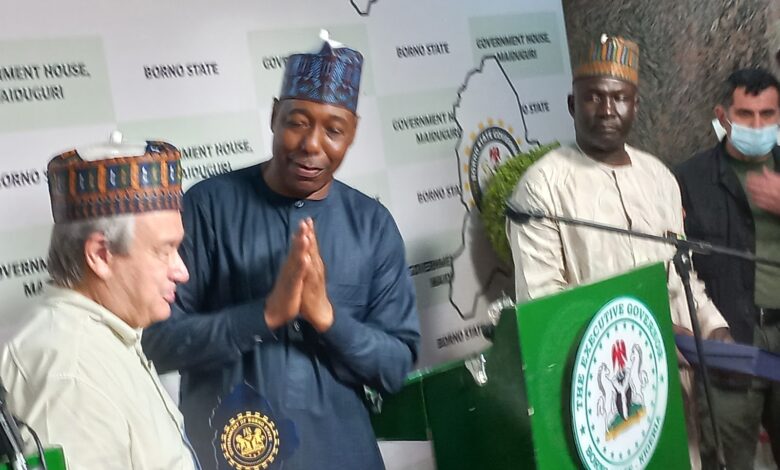UN Secretary-General Commits To Advocating For Conflict-Torn Borno State
United Nations Secretary-General, Antonio Guterres, visited Borno for the first time and says his experience altered his initial perceptions about the conflict-torn state.

Guterres made this commitment at the end of his official visit to Maiduguri, the state capital, on Tuesday, May 3, 2022.
The UN chief visited the Maiduguri Hajj Camp where he met with surrendered terrorists before he later moved to the Gubio IDP camp.
Guterres thereafter had a brief close door meeting with the governor, Babagana Zulum, before attending the official courtesy call that was followed by a press briefing.
Speaking about his visit and what he made of the situation, the UN secretary-general said his visit to the state symbolises the international community’s commitment to ending terrorism and building peace.
“The fact that I came to Borno state is symbolic of our priority to fight terrorism in the world and to create solutions for the victims of terrorism,” he said.
He noted that a substantial part of what he had read since his time as UN High Commissioner on Refugees was about “a Borno state of terrorism, displacement and violence. This is not the Borno I found today. I found a Borno of hope, a Borno with a future,” he added.
Guterres said he was impressed with the policy of a non-kinetic approach to ending terrorism which the government of Borno is deploying to tackle the Boko Haram conflict.
“The policy put in place by Borno state government recognises that you don’t fight terrorism by military means alone, you fight terrorism by addressing the root cause of terrorism. And the policy of the governor aiming at establishing fully the confidence between the people and the government is an essential element that could be implemented in reality,” he said.
Appreciates IDPs’ craving to go home
The Secretary-General said despite the humanitarian support being given to the IDPs, their desire to return home speaks volumes of their willingness to support the government’s post-conflict situation.
“It is essential to acknowledge that in situations like this, it is not enough to even provide basic assistance,” he said.
“Because the people I met today want more than that. They want to go back to safety and dignity. When one looks at a state like Borno, we have to understand that to address terrorism effectively is t provide only hope but a future of reality. We need to invest in livelihood,” the Guterres stressed.
Meeting surrendered Boko Haram members
The Secretary-General said he was elated when met with former terrorists who surrendered recently. He acknowledged their resolve to turn a good leaf and become good members of their communities.
He stressed that to get the reintegration of the former terrorists into the communities they had once terrorised, the governmental and the humanitarian community “need to invest in the reintegration of those that in the past have been recruited into terrorism by Boko Haram.”
“I was amazed to see today in the holding centre those that have been terrorists now want to be in the society; they want to contribute to the society. This is a laudable policy you have here; a policy of reconciliation, a policy of reintegration, a policy aimed with a development perspective to allow for terrorism to be eliminated so that the people can be able to construct their future in confidence,” he said.
An advocate for Borno
While congratulating the state governor for what he had seen during his short visit that lasted for about four hours, Guterres said he would thenceforth assume the role of an advocate for the state at the international community level.
“With what I have seen here, I want to strongly appeal to the international community to understand and see Borno as a state of hope. To support humanitarian action in Borno; we must recognise the humanitarian challenges Borno faces – climate change, Boko Haram, and invest in the Borno of hope,” he said.
“We need to provide support to the project of the government of Borno, to the civil society in Borno to create a safe society for real development in which schools work, hospitals work and people can live in peace and solidarity. So I will be your advocate Mr Governor within the international community to support and invest in the Borno of hope,” Guterres promised.
Earlier, the governor had presented a lengthy speech derailing the challenges faced by the state and efforts being made to overcome them.
Support Our Journalism
There are millions of ordinary people affected by conflict in Africa whose stories are missing in the mainstream media. HumAngle is determined to tell those challenging and under-reported stories, hoping that the people impacted by these conflicts will find the safety and security they deserve.
To ensure that we continue to provide public service coverage, we have a small favour to ask you. We want you to be part of our journalistic endeavour by contributing a token to us.
Your donation will further promote a robust, free, and independent media.
Donate HereStay Closer To The Stories That Matter




